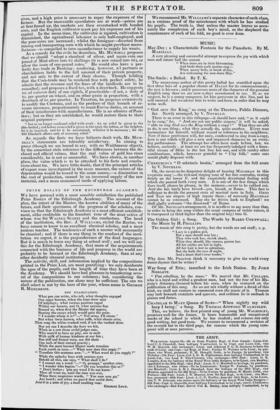PRIZE ESSAYS OF THE EDINBURGH _ACADEMY.
WE have perused with a most sensible satisfaction the published Prize Essays of the Edinburgh -Academy: The account of the plan, the report of the Master, the known abilities of many of the tutors, and their specimens of the .progress of the scholars, con- vince us that the Edinburgh Academy is a most efficient establish- ment, alike creditable to the founders (one of the Most active of whom was Sif WALTER SCOTT) and the conductors. The head of the institution, the Rev. J. WILLIAMS, styled the Rector, we have reason to know is an excellent classical scholar, and a most zealous teacher. The tendencies of such a master will necessarily be classical; and if .there is any thing in the conduct of the insti- tution we regret, it is the preponderance of the dead languages. But it is much to learn any thing at school well; and we will say this for the Edinburgh Academy, that more of the acquirements connected with the business of life and progress in the world are probably to be learned at the Edinburgh Academy, than at any other decidedly classical institution.
The activity, skill; and information implied by the compositions printed in the Prize List, are most gratifying : we only desiderate the ages of the pupils, and the length of time they have been at the Academy. We should have had pleasure in transferring seve- ral of the compositions to our columns; but, considering the nature of the publication, one alone may be sufficient. The one we shall select is not by the hero of the year, whose name is GEORGE R. MONCREIFF-
TIIE EXAMINATION.
What pen can write, who tell, what thoughts engaged Our eager bosoms, when the time drew near Of holydays; what various passions raged Within our breasts and 0, what anxious fear Roused us, when breasts, the Master did appear, Bearing the essays which would gain the prize. " I wonder whose it is?"—" Not mine, I'll swear."
But when 'twas known, what ruffs, what shouts arise, That rang the white-washed roof, if not the vaulted skies.
Nor yet can I describe the fears we felt, When in a row those awful judges sate, Who seem'd to have no pity, nor to melt With milk of human kindness at our fate ; But stiff and formal were, nor did abate One inch of their eternal gravity ; While the most learned Master made translate Each youth in turn.—" What now does this imply ?" " Translate this sentence now."—" What word do you supply?"
While the unlucky boys with anxious eyes Behold all this, one says, "What shall I do?
"I cannot say a word."—" 0, prompt," another cries.
"I wonder who begins."—" Do you translate this so?" "Don't bother; 'pon my word I do not know." Thus all Went on, until the time was o'er, When these auspicious words, "You now may go," Are heard; and when we pass'd that awful door,
Join'd in a note of joy, a loud exulting roar.
GEORGE LOCK.
We recommend Mr. WILLIAMS'S separate character of each class, as a curious proof of the minuteness with which he has studied his pupils. The truth 13, that unless the master learns as accu- rately the complexion of each boy's mind, as the shepherd the countenance of each of his fold, no good is ever done.


























 Previous page
Previous page